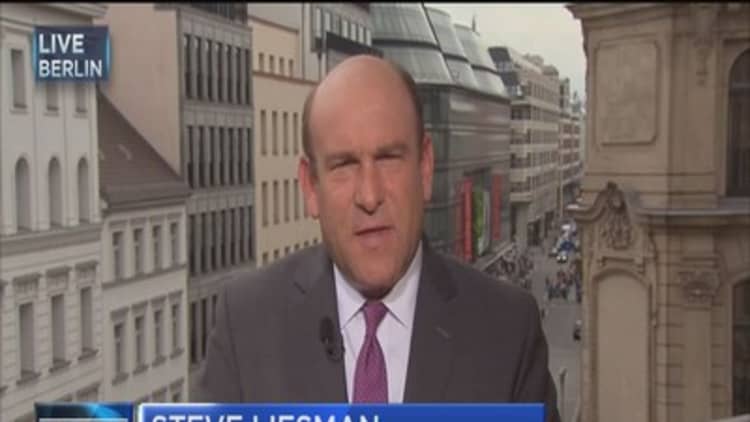Power, politics and ideology – they've all come into play in the Greek bailout talks with ramifications for how the single currency club is run in the future, analysts say.
Erik Nielsen, group chief economist at UniCredit Research, told CNBC that Greece has become the "battleground" where a philosophical divide between Germany and France – the euro zone's two biggest economies – is being fought.
In short, it comes down to whether the euro zone should be ruled along the lines of German-based discipline or French flexibility.
"The German signal to Greece – and to France and the rest of the euro zone - is clear: financial support to a member (of the euro zone) is possible only against credible policy conditionality, and if that credibility is not there, it can happen against collateral – or you leave," Nielsen said.
"Putting 'exit' on the table by Germany is an incredibly important event," he added, referring to reports that Berlin had suggested Greece could "temporarily" leave the single currency club.
Deal at a price
Months of fraught talks came to a head on Monday when Greece secured conditional agreement to receive up to 86 billion euros ($95.29 billion) worth of aid over three years in return for sweeping reform measures such as tax hikes, an overhaul of pensions and tighter supervision of state finances.
Read MoreEuro zone has lost credibility: German Fin Min
France, on the other hand, is credited with preventing a "Grexit" and encouraging the country's anti-austerity Prime Minister Alexis Tsipras to agree to tough measures in return for aid.
However, the result - while averting Greece's collapse and a hasty exit from the euro zone - also sends some worrying signals, analysts said.
"What you saw happening is basically the creditors able to get their way in a manner that suggests the euro zone isn't necessarily the community of values we thought it was, but a transaction framework where those with power are able to get their way," Rem Korteweg, a senior researcher at think-tank Centre for European Reform in London, told CNBC.
Indeed, in the 24 hours since the deal was announced there has been a wave of criticism about the tough terms leveled at Greece, with the term "coup" prominent on Twitter.

Polarizing
"This is an extremely controversial and polarizing deal which raises all sorts of uncomfortable questions about national sovereignty, the credibility of the euro zone and the future governance of the bloc," Nicholas Spiro, managing director at Spiro Sovereign Strategy, told CNBC.
"While it's clear that Tsipras' efforts to challenge the eurozone's German-led policy regime have failed spectacularly, the German-led ultimatum to Greece raises the stakes significantly and could plunge the euro zone into an even deeper political crisis."
The measures that Tsipras agreed to on Monday were much tougher than those rejected by Greek voters in a July 5 referendum.
And for some, the crisis looks far from over.
"I don't think the last words have been said on this. Put it this way, if Greece gets a deal then falls of the program, the French have a big issue politically because they have tied their mast to Greece," Nielsen at UniCredit said.
"The main thing is: does this program hold; can the Greek government survive – it is the battle of Europe, in a sense, that is going on here?"


